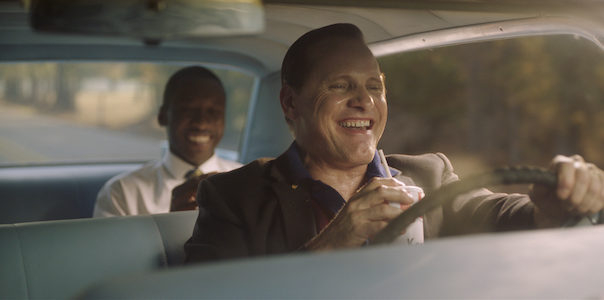
ReelBob: ‘Green Book’ ★★★
By Bob Bloom
“Green Book” doesn’t break any new ground nor unearth deeper insights about race relations.
What it does accomplish is detailing the journeys of two men from vastly dissimilar backgrounds, who, through circumstances, meet at a point where they can see each other as people instead of preconceived stereotypes.
Academy Award-winner Mahershala Ali and Viggo Mortensen star in this odd-couple, road-trip movie, which is set in 1962.
In the movie, based on a true story, Ali plays Dr. Don Shirley, a world-famous pianist, set to begin a multimonth tour that will take him through the Midwest and then the Deep South.
Mortensen is Tony “Tony Lip” Vallelonga, a bouncer at the Copacabana nightclub, who, when the Copa closes for a few months for renovations, is hired to be Shirley’s driver.
Lip, who lives in the Bronx with his wife, is almost your stereotypical Italian-American. Basically, he is distrustful of anyone who is not the same ethnicity as he or from his neighborhood.
Tony Lip is Vallelonga’s nickname, earned, as he explains to Shirley, because he can talk himself out of any situation and is a formidable b.s. artist.
Tony is hired to drive Shirley on this tour, serve as a de facto trouble shooter and be the guardian of the “Green Book,” a publication that informs black people at which hotels they can stay and at what restaurants they can dine, while traveling through the South.
A Pygmalion element exists within the movie. Lip, a hustler who is always out to make a buck, is rough around the edges and speaks like a member of the Bowery Boys, or at least a character out of “GoodFellas.”
Shirley is a sophisticated gentleman, but he is rather naïve about the outside world.
The two are mismatched, so the beginnings of their journey are rather rough. Shirley is condescending and a bit snobbish toward Tony.
Shirley prefers silence, and Lip loves to talk.
As the tour continues, Shirley and Lip begin to talk to — instead of at — each other.
Shirley helps Lip improve his vocabulary and diction, while Lip helps loosen his tightly wound passenger. Shirley helps Lip with the letters he writes his wife, while Lip introduces Shirley to Kentucky Fried Chicken. Quid pro quo!
The movie is directed by Peter Farrelly, who is best known for the low-brow comedies he made with his brother, Bobby, such as “There’s Something About Mary,” “Dumb and Dumber,” “Kingpin,” “Me, Myself and Irene” and “Stuck on You.”
He is not quite up to the task of bringing the insight necessary to make the movie as compelling as it should be. It mostly rests on predictable sequences that detail the converging roads of the travelers.
“Green Book” rests on the shoulders of Ali and Mortensen. Their trajectory is quite familiar — two people with nothing in common, who, thrown together, form a bond and come to appreciate their differences.
Ali makes you earn Shirley’s loyalty. He is a cold and exacting individual, a loner who comes alive in front of an audience and is a master at glad-handing patrons yet is inadequate in one-on-one situations.
He basically lives in a cocoon of music and is unfamiliar with the outside world and regular working stiffs.
Shirley also bears the indignities heaped on black people in the South during

Mahershala Ali as Dr. Donald Shirley and Viggo Mortensen as Tony Vallelonga in “Green Book,” directed by Peter Farrelly.
that era. At a performance at a plantation, he is not allowed to use the bathroom; his host gently tells him that the outhouse is available.
At one venue where he is to perform, he is refused service in the dining room.
At first, Mortensen’s Tony seems like your stereotypical goombah, yet his exterior belies a sentimental and smart interior. He may not have the greatest command of the king’s English, but he is observant, not only of the world around him, but of Shirley’s lack of comprehension about it.
At times, the movie sinks into the melodramatic, such as when Shirley and Lip are stopped in a Louisiana town and jailed for breaking the so-called “sundown laws,” which forbade blacks to be outside after dark.
One of the movie’s main drawbacks is, that like many movies set during this era, it is told from a white perspective, which seems disingenuous because Shirley is the one experiencing most of the soul-crushing incidents shown in the movie.
The movie needed more subtlety, instead of the broad strokes Farrelly uses. Making “Green Book” a feel-good movie lessens the impact of the insidious practice of segregation, created to diminish and marginalize American citizens because of the color of their skin.
“Green Book,” overall, is a fine movie, mainly because of Mortensen and Ali. They work hard to make the film a positive experience, which they mostly succeed in doing.
But, in the back of your mind — and in your heart — you know what is on screen is quite the sanitized version meant to make viewers feel good, while it propagates the lie that our nation has advanced in the last 50-plus years.
I am a founding member of the Indiana Film Journalists Association. My reviews appear at ReelBob (reelbob.com) and Rottentomatoes (www.rottentomatoes.com). I also review Blu-rays and DVDs. I can be reached by email at bobbloomjc@gmail.com or on Twitter @ReelBobBloom. Links to my reviews can be found on Facebook, Twitter, Google+ and LinkedIn.
GREEN BOOK
3 stars out of 4
(PG-13), mature themes, language, racial epithets, violence, sexual situations, smoking
